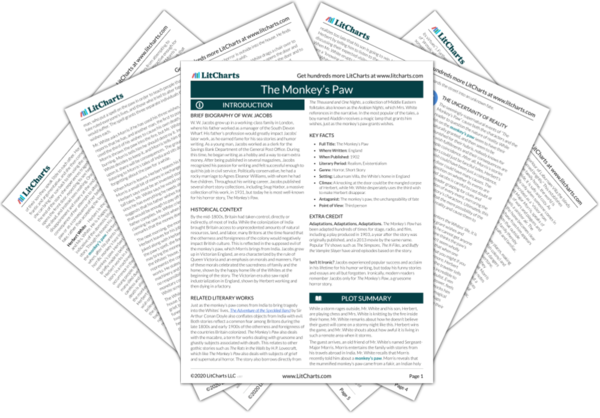During Jacobs’ lifetime, Britain underwent rapid industrialization. Jacobs shows the harms caused by industrialization in Herbert’s death through a machinery accident and the company representative’s cold response to the Whites. With this tragedy, Jacobs grounds the horrors of “The Monkey’s Paw” in the real life social issues surrounding industrialization, such as dangerous working conditions and worker exploitation.
Herbert goes to work in a factory every day, like many young people in Britain during the period of industrialization and, like so many factory workers, Herbert dies in a machinery accident. His death exposes one of the main harms of unchecked industrialization; dangerous working conditions in factories. When the representative of the factory’s owners comes to inform the Whites of their son’s death, the stranger is awkward and indirect. However, he makes sure to clearly state that the company claims no responsibility for what happened in their factory. Here, Jacobs shows the cold and exploitative nature of factory owners during the period of industrialization, who maximized profit while caring little for safe working conditions for their employees. In contrast to the supernatural and ambiguous nature of the monkey’s paw, the consequences of industrialization are unequivocally present in the harsh realities of Jacobs’s era. This contrast allows the reader to question whether or not Herbert’s death is the result of Mr. White’s use of magic or an unfortunately common occurrence due to the poor working conditions of factories, thus further blurring the lines of reality and the inevitability of fate within the story.
Industrialization ThemeTracker

Industrialization Quotes in The Monkey’s Paw
“I was to say that Maw and Meggins disclaim all responsibility…They admit no liability at all, but in consideration of your son’s services, they wish to present you with a certain sum as compensation.”

Unlock explanations and citation info for this and every other The Monkey’s Paw quote.
Plus so much more...
Get LitCharts A+But the days passed, and expectation gave place to resignation–the hopeless resignation of the old, sometimes miscalled, apathy. Sometimes they hardly exchanged a word.











